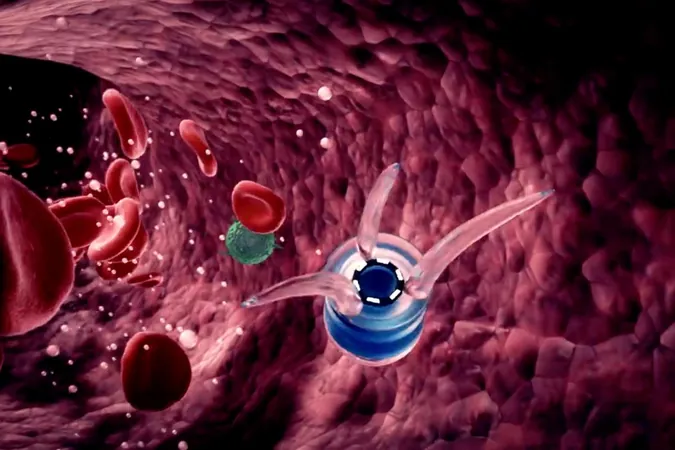
Unlocking the Secrets: How Gut Microbes May Be Key to Combating Child Malnutrition
2025-09-11
Author: Wei
The Global Crisis of Child Malnutrition
Malnutrition affects millions of children globally, with a staggering 150 million kids under five suffering from stunted growth due to inadequate nutrition. However, poor food quality is just the tip of the iceberg.
The Hidden Role of Gut Microbes
A decade ago, researchers at Washington University School of Medicine unearthed another culprit: the gut microbiome. When these microbial communities go haywire, they can exacerbate the already dire consequences of malnutrition. New collaborative research with the Salk Institute and UC San Diego sheds more light on this critical issue.
New Insights from Malawi's Toddlers
In Malawi, one of the most affected regions, researchers found that toddlers with unstable gut microbes experienced significantly poorer growth outcomes compared to those with stable microbial environments. Although all the children were at high risk of stunting and acute malnutrition, this instability added another layer of complication.
Dr. Mark Manary, a leading pediatrician at WashU, emphasizes the importance of gut microbes, stating, "We know gut microbes are important mediators of malnutrition. Understanding how changes in these microbes contribute to the condition could lead to innovative diagnosis and treatment strategies for millions of children worldwide."
Building a Microbial Library for Future Solutions
This groundbreaking study led to the development of a pediatric microbial genome library, containing genetic profiles of 986 microbes derived from the fecal samples of Malawian children. This vital resource aims to enhance prevention and treatment approaches for malnutrition.
From Peanut Butter to Microbial Solutions
Dr. Manary has a long history of addressing nutritional challenges in Malawi. He was pivotal in creating a peanut butter-based therapeutic paste over 20 years ago that has transformed the care of severe malnutrition. Yet food alone can’t guarantee full recovery; many survivors continue to face developmental hurdles.
The Microbial Balance and Nutritional Recovery
Malnutrition disrupts the delicate balance of gut microbes, allowing harmful species to thrive while beneficial ones decline. This instability might explain why many children struggle to recover fully, even when their diet improves.
Connecting Gut Health with Growth Potential
The latest research confirms a long-held belief: the gut ecosystem is crucial to nutritional health. Malnourished children often show delayed microbial maturation, resembling that of much younger kids. This immaturity can obstruct nutrient absorption and weaken immune responses.
For instance, certain gut bacteria promote the production of short-chain fatty acids essential for intestinal health and immune system function. Disruptions in these processes can entrench the malnutrition cycle.
Tracking Growth Through Microbial Stability
The researchers collected and analyzed 47 stool samples from eight Malawian toddlers over 11 months, who had previously participated in a trial using legume-based foods. Those with stable gut microbial populations showed better growth outcomes, marking microbial stability as a potential growth indicator.
Advancing Research with Cutting-Edge Sequencing
Utilizing long-read sequencing, a revolutionary technique that provides comprehensive microbial insights, the study further strengthens our understanding of child malnutrition and its intricate links to gut microbiomes. Dr. Kevin Stephenson at WashU remarks, "Improving accuracy in identifying microbial communities can illuminate aspects of undernutrition that were previously unmeasurable."
Creating Databases for Global Health
The sequencing effort has resulted in the creation of a pioneering microbial genome library that might serve as a cornerstone for future research, particularly in low-resource areas where malnutrition persists.
Dr. Todd Michael from Salk notes, "Our genome-sequencing and pangenomic approaches can deliver real-time insights, setting a new bar for scientific research globally."
A Shared Hope for the Future
This research represents more than technical advancements; it underscores how gut microbiomes and human biology evolve together. Restoring microbial balance may prove as crucial as food intake in combating malnutrition.
By focusing on microbial health, we may develop new therapeutic strategies that incorporate probiotics and prebiotics, addressing the root causes of malnutrition rather than merely its symptoms. Although malnutrition is one of humanity's oldest battles, this fresh perspective on gut health brings renewed hope for affected children worldwide.
This significant study is published in the journal Cell.




 Brasil (PT)
Brasil (PT)
 Canada (EN)
Canada (EN)
 Chile (ES)
Chile (ES)
 Česko (CS)
Česko (CS)
 대한민국 (KO)
대한민국 (KO)
 España (ES)
España (ES)
 France (FR)
France (FR)
 Hong Kong (EN)
Hong Kong (EN)
 Italia (IT)
Italia (IT)
 日本 (JA)
日本 (JA)
 Magyarország (HU)
Magyarország (HU)
 Norge (NO)
Norge (NO)
 Polska (PL)
Polska (PL)
 Schweiz (DE)
Schweiz (DE)
 Singapore (EN)
Singapore (EN)
 Sverige (SV)
Sverige (SV)
 Suomi (FI)
Suomi (FI)
 Türkiye (TR)
Türkiye (TR)
 الإمارات العربية المتحدة (AR)
الإمارات العربية المتحدة (AR)